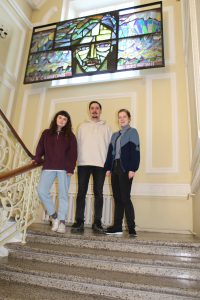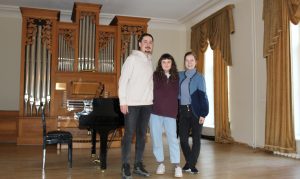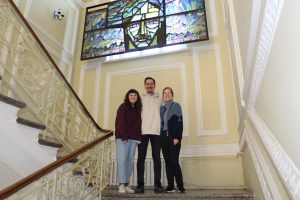Erasmus+ students from Serbia, Ukraine and Finland share their experience
The Erasmus+ programme aims to support the educational, professional and personal development of the participating students and graduates and this aim is being indicated in Erasmus student charter. One of the programme’s slogans is “Enriching lives, opening minds”, therefore, while Spring semester at Lithuanian Academy of Music and Theatre is halfway through, we are having a conversation with three Erasmus+ students from Serbia, Ukraine and Finland.
 Igor Sarajlič is a doctoral student from University of Arts in Belgrade, who is a conductor. Mariia Berezovets is studying documentary film directing in Kyiv National I. K. Karpenko-Kary Theatre, Cinema and Television University and Lotta Aakko is a music pedagogy (classical singing) student from Oulu University of Applied Sciences, School of Media and Performing Arts in Finland.
Igor Sarajlič is a doctoral student from University of Arts in Belgrade, who is a conductor. Mariia Berezovets is studying documentary film directing in Kyiv National I. K. Karpenko-Kary Theatre, Cinema and Television University and Lotta Aakko is a music pedagogy (classical singing) student from Oulu University of Applied Sciences, School of Media and Performing Arts in Finland.
Why did you select Lithuanian Academy of Music and Theatre for your Erasmus studies?
Igor: Among the universities that were presented to me for the mobility exchange, Lithuanian Academy of Music and Theatre had similar study programme to my institution. Since the moment of enrollment of application, I was provided with significant assistance and cooperation coming from both Lithuanian Academy of Music and Theatre and my institution coordinators that made application process so much easier. Regarding the motivation for selection of Lithuanian Academy of Music and Theatre it is a connection between characteristics of ancient and pagan traditions that is relevant for my doctoral thesis. This includes combination of national folk music and also classical compositions.
Lotta: I wanted to see a different city. This school was recommended by my host university and I got good recommendation from the teachers that said that here it will be more chances to take performing classes.
Mariia: We had connections between our institutions. Moreover, I was always thinking to experience other cultures, to get to know how they teach their students and comeback with this knowledge to my country and share it.
What were your expectations before studying in Vilnius and how did they change during studies here?
Igor: My expectations were to gain more practice in working with classical orchestras. I was given a chance to become a student of associate professor Dainius Pavilionis and be of assistance of lecturer Modestas Barkauskas. This experience with prolific conductors is going to influence my musical perspective and professional growth.
Lotta: I wanted to have more singing classes, because I am in pedagogical programme at my home university and completed almost all my pedagogical studies, so this was a chance for me to have more performing classes, more singing and I was really surprised how good resources I have – 3 singing classes per week, also I can study piano. In my home university in Oulu, if you want to study piano as a singing student the time will be cut out from your singing lessons. I also could take dance classes for opera singers. I heard from other students who study here good feedback about acting classes and opera studio. I expected a lot, but my expectations went even over.
 Mariia: Film schools especially documentary directing is very insight thing of the country, because it has its own issues and wants to bring them up. It is like going to the other pond of thinking. Right now, I can see my directing not only from my countries’ perspective. It went really well, because now in a lot of classes we were talking mostly about Ukraine, but still we also discuss theatre performance as well. Also, it is very interesting how different film schools could be identified and recognized visually.
Mariia: Film schools especially documentary directing is very insight thing of the country, because it has its own issues and wants to bring them up. It is like going to the other pond of thinking. Right now, I can see my directing not only from my countries’ perspective. It went really well, because now in a lot of classes we were talking mostly about Ukraine, but still we also discuss theatre performance as well. Also, it is very interesting how different film schools could be identified and recognized visually.
What challenges have you faced during your Erasmus studies?
Igor: the greatest challenge was getting in touch for the first time with Lithuanian, Latvian, Estonian contemporary composers through rehearsals in professional and student orchestras. This experience gave me an insight of contemporary music scene performance of Lithuania and its surrounding countries.
Lotta: My greatest challenge was to adjust to completely different pedagogical culture here, which is very interesting and is the reason why I decided to come here, because I will graduate as a singing teacher and I wanted to widen my point of view. Another challenge was the language, because some of the courses I would have wanted to take, but they weren‘t available in English. The other challenge was at least for classical singers there is a lot of material that we need to learn, you have to study a lot and it is great, I enjoy it, but then as I discussed with other students there is very little energy in the beginning left to adapt to the culture.
Mariia: My biggest challenge became my biggest pro, because most of the classes were in Lithuanian and right now I can see it as a big plus, because I can adapt to Lithuanian society and make great connections. It would not be possible if I would be surrounded by international students in classes. Teachers are so good, because they trying make their course in English and Lithuanian students understand English perfectly. Teachers also can speak in English or Russian. At first I didn‘t know what to do, because classes were in Lithuanian, but later we adapt to each other in classes.
 How different is teaching methodology here in comparison to your home university or academy?
How different is teaching methodology here in comparison to your home university or academy?
Lotta: Here I am studying more performing arts than in my home university. Here we study material way more, but then less time is left for creativity or your own choices, what you want to focus on. For instance, you need to preparemore songs of different time periods and styles for exams. This is big difference. In my school we have more flexibility programme wise, and we don’t need to go through so much materialand we have exams only every other year. Also we don‘t have philosophy or music aesthetics, which here I find very interesting and it helps you to understand the culture. In my pedagogical study programme we focus more on different age groups and psychological challenges when you teach and how to teach them.
Mariia: It is not so much different. As I have courses with script writers that really helps me, because we have to prepare material to pitch, to come up with new ideas and it is really good for my profession of documentary directing. Courses such as creative writing, pitching make me move. In Ukraine in my main class every week we discuss how we are moving forward, but only in one specific project and here we are doing more projects and it makes you more creative, for instance, how to shoot that movie that you were working on.
Igor: The methodology of teaching is similar to my country when I compare it to my professor‘s and university with only one major difference – obtaining constant rehearsals is of major importance for conductors and I have been given a chance here, which I have not been given at my university.
Would you recommend any tips or advices to students who are thinking about Erasmus studies, but did not go yet?
Igor: First of all, just to be open-minded, not to have any prejudice, envision how their studies should look, also be mentally prepared for paperwork.
Lotta: Paperwork, be prepared that it will take time. Also there might be situations when people don‘t speak your language in the class and you need to have someone that speaks in English and has connection with the teachers. Access to the rehearsing rooms were difficult in the beginning and I also strongly recommend the dormitory, because I lived for one and a half weeks in Airbnb alone and its harder when you don‘t know any people. It is faster when you know people and you can go together to the classes.
Mariia: First of all, if you have a problem don‘t be afraid to ask other people for help. Always there will be people that will help you. Also, it is the time when you can go and push your limits. I am introverted and shy person and this exchange helps me, because I would not meet new people in my country. You should do it when you are young and you will always remember this experience.
Lotta: You can also do this when you are old.
What is the influence of Erasmus experience for your personality and career wise?
Lotta: It is very good when you have to go out of your comfort zone, because then you are forced act different, see different perspectives. Personally, for me I can learn new teaching approaches and can use it in my teaching practice and in my performances as well. I am looking forward to work with actresses, widen area how we can approach acting for opera singers, because in Finland we have only one academy that teach acting for opera singers. From personal perspective, it always teaches you to see that people can have really different approaches when they are from different backgrounds, different culture and different situation.
Mariia: I believe that cinema world is very small and this is better for the connections. Also, it is good to go to other country to film your production, because you are not a citizen of this country and you can see the country from the other perspective and this is good for me as a documentary director. During exchange studies you grow twice faster since there are things that happen to you every day that usually don’t happen at your home country and you have to deal with that.
Thank you for the conversation.
Prepared by Audrius Dabrovolskas
Senior specialist in International Relations Office
29 March 2022
